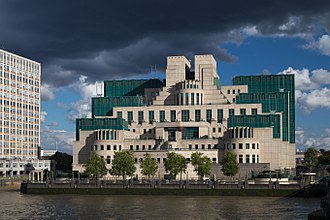This article needs additional citations for verification. (November 2020) |
An intelligence agency is a government agency responsible for the collection, analysis, and exploitation of information in support of law enforcement, national security, military, public safety, and foreign policy objectives.[1]





Means of information gathering are both overt and covert and may include espionage, communication interception, cryptanalysis, cooperation with other institutions, and evaluation of public sources. The assembly and propagation of this information is known as intelligence analysis or intelligence assessment.
Objectives
editIntelligence agencies can provide the following services for their national governments.
- Give early warning of impending crisis;
- Serve national and international crisis management by helping to discern the intentions of current or potential opponents;
- Inform national defense planning and military operations, known as military intelligence;
- Protect sensitive information secrets, both of their own sources and activities, and those of other state agencies;
- Covertly influence the outcome of events in favor of national interests, or influence international security; and
- Defense against the efforts of other national intelligence agencies, known as counterintelligence.
There is a distinction between "security intelligence" and "foreign intelligence". Security intelligence pertains to domestic threats, including terrorism and espionage. Foreign intelligence involves information collection relating to the political, or economic activities of foreign states.
Some agencies have been involved in assassination, arms trafficking, coups d'état, and the placement of misinformation propaganda and other covert and clandestine operations to support their own or their governments' interests.
See also
editReferences
edit- ^ Szoldra, Paul (May 11, 2013). "These 17 Agencies Make Up The Most Sophisticated Spy Network In The World". Business Insider.
Further reading
editBooks
- Encyclopedia of Espionage, Intelligence, and Security, hrg. von K. Lee Lerner and Brenda Wilmoth Lerner, 3 Bände, Detroit [u.a.]: Gale [u.a.], 2004
- Rhodri Jeffreys-Jones, Cloak and Dollar: A History of American Secret Intelligence, Yale University Press, 2002
- Richard C. S. Trahair, Encyclopedia of Cold War Espionage, Spies, and Secret Operations, Westport, Conn. [u.a.] : Greenwood Press, 2004
- Amy B. Zegart, Flawed by Design: The Evolution of the CIA, JCS, and NSC, Stanford, Calif.: Stanford Univ. Press, 1999
Journals
- The Journal of Intelligence History
External links
edit- Central Intelligence Agency, the intelligence agency of the United States
- Ministry of State Security, the intelligence agency of China
- Foreign Intelligence Service, the intelligence agency of Russia